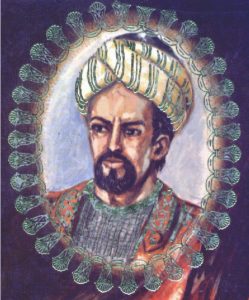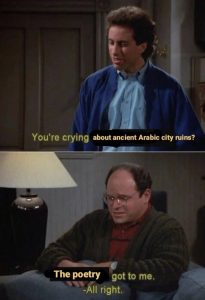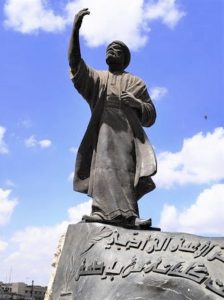The Struggles and Triumphs in Translating Arabic Poetry
by Jenna Nahhas
Unless your name happens to be Amanda Gorman, being a poet in the 21st century does not typically mean fame and fortune. But in the medieval Mediterranean, the life of a poet was full of political intrigue, civic ambition, and sometimes, in the case of “The Would-Be Prophet,” death threats (Osei).

Born in the early 10th century in Iraq, the self-proclaimed prophet Abu at-Tayyib Ahmad ibn Huseyn al-Mutanabbi al-Kindi wrote poems from the age of nine, spending his free time at the age of 17 leading a revolt in Syria. By age 33, the poet served in the court of Syrian prince Sayf al-Dawla, writing panegyric qasida, Arabic poetry lauding the greatness of his patron (Osei). It was during this time that al-Mutanabbi wrote one of his most famous poems, “Ode to Sayf al-Dawla.” Although a masterful work of literature, this ode, written in high medieval Arabic, is difficult to translate into English. This September, I met with Ohio Wesleyan University’s own Dr. Abdeer Abdelaal to discuss a translation of al-Mutanabbi’s “Ode to Sayf al-Dawla.

Dr. Abdelaal works primarily in Spanish-Arabic translation; she has translated 30 books. My conversation with her revealed that, no matter how skilled the translator, the intricacies of the original language are often lost. She explains that the translator must prioritize the poem’s content, followed closely by “the beauty, the character and style of the poem.” Additionally, as different as Shakespearean English is to modern English are, so is medieval Arabic to modern Arabic. Dr. Abdelaal describes it as the following: translating Arabic poetry to English “translates the content, not the beauty.
We talked about three major translation issues, one of which concerns rhyme schemes. Al-Mutanabbi’s “Ode to Sayf al-Dawla” has 46 lines, each ending in the Arabic “م”, as colored in red in the poem’s first three lines below. Additionally, the first half of the first two lines even contribute to the rhyme, as colored in blue:
على قدر أهل العزم تأتي العزائمُ وتأتى على قدر الكِرام المكارمُ
وتعظم فى عين الصغير صغارهم وتصغر فى عين العظيم العظائم
يكِلٌف سيفُ الدولة الجيشَ همهٌَ وقد عجزت عنه الجيوشُ الخضارم
However, in the English translation from A. J. Arberry’s Arabic Poetry: A Primer for Students, there is no rhyme scheme or visual separation between line halves:
According to the degree of the people of resolve come the resolutions, and according to the degree of noble men come the noble actions.
Small deeds are great in the eyes of the small, and great deeds are small in the eyes of the great.
Saif al-Daula charges the army with the burden of his own zeal, which numerous armies
have proved incapable of bearing.
Another visually stark difference between the translations brings me to my second point: wordiness. What is expressed in a single, elegant word in Arabic may take multiples English words to capture the same meaning. Dr. Abdelaal pointed out that because Arabic has many more words for the English word “love,” descriptive phrases in English muddy the single-word impact of unique Arabic terms. For example, وله (walah) can be translated as “amourous rapture”, and شغف (shaghaf) means “to be madly in love” (Arabic Genie). In the case of the excerpt above, the English contains 65 words, while the Arabic consists of only 31; other than the first, each phrase is only 5 words.
One cause of this wordiness concerns a more technical translation issue: derivatives. The second line of the the poem uses derivatives of the root word “عظيم” (an adjective meaning great or magnificent) in clever wordplay: “عظيم” becomes the verb “تعظم” (to magnify), the singular noun “العظيم” (the great), and the plural noun “العظائم” (the greats):
وتعظم فى عين الصغير صغارهم وتصغر فى عين العظيم العظائم
However, in English, this concise, ten-word line becomes a choppy, twenty-one-word line where “great” is only present as an adjective and noun:
Small deeds are great in the eyes of the small, and great deeds are small in the eyes of the great.
In order to capture the impact of these Arabic derivatives, English must use multiple words. Additionally, because the English translation lacks the verbal use of “great,” it takes away, as Dr. Abdelaal points out, the action a verb imparts. The original meanings and wordplay are lost in translation.
However, while the original wordplay may be lost, translators work hard to ensure the meaning is always retained. If the source language’s metric and rhyme cannot be translated, they must search for alternatives in the target language. Dr. Abdelaal points out that “sometimes the translation is more impactful and prettier than the original.” This is when the beauty of translation flourishes: in the creative solutions.
After conquering the impressive barrier of translation, the wonderfully political and emotional world of medieval Arabic poetry comes to life. Alongside panegyric poems came powerful city elegies as poets mourned the destruction of cultural centers such as the Córdoban palace Madinat al-Zahra. For enduring the discussion on translation, dear reader, here is a poem by Muhyi al-Din ibn al-Arabi for your enjoyment:
Halls alongside of playground gleam,
but they have no occupants and they are in ruins.
Birds are lamenting in them from every side,
At times they are silent, other times cooing.
I addressed one of the wingborn singers,
who was sad at heart and aquiver.
“For what do you lament so plaintively” I asked,
And it answered, “For an age that is gone, forever.”

A figure as monumental as the cities thus mourned, Al-Mutanabbi met his end the same way he had forged his legacy: with a poem. Never one to hide his true intentions, he had been kicked out of multiple courts for his political ambition and tendency to insult people in his poems. After writing such a poem about one Ḍabbah al-Asadī, he was confronted by the man. Urged not to stand down by a servant who quoted the Would-Be-Prophet’s own daring poetry at him, al-Mutanabbi was killed in the ensuing fight.
Although hated by some in his time, Al-Mutanabbi is credited as “one of the greatest and most influential poets in the Arabic language” by many today (Nahhas). A proud poet who never backed down from a challenge, he left a magnificent portfolio of odes and defamatory quips alike. With clever wordplay and devastating pathos, poets captured the essences of court life and civil war alike. Reading odes to ancient fallen cities, I cannot help but be reminded of Arabic cities still being destroyed today. As a descendant of the Lebanese Civil War diaspora myself, I wonder: Who will be the poets, the artists, and the creatives who will memorialize those cities lost in the century past and the centuries to come?

References
Abdelaal, Dr. Abeer. Personal interview. 13 September 2021.
Al-Mutanabbi, Abu al-Tayyib. “Ode to Saif al-Daula.” Arabic Poetry: A Primer for Students,
edited by A. J. Arberry, The Syndics of the Cambridge University Press, 1965, pp. 84-91.
Love in Arabic: which translation is correct?” Arabic Genie, 18 Aug 2018,
https://www.arabicgenie.com/2012/08/love-in-arabic-which-translation-is-correct. Accessed
4 Oct 2021.
Nahhas, Roufan. “Al Mutanabbi and the Arrogance Within: The Life of a Great Arabic Poet.”
Inside Arabia: Voice of the Arab People, 12 Sept. 2020,
https://insidearabia.com/al-mutanabbi-and-the-arrogance-within-the-life-of-a-great-arabic-p
oet/. Accessed 18 Sept. 2021.
Osei, Nana. “Al-Mutanabbi: The Greatest Arab Poet.” Arab America, 3 July 2019,
https://www.arabamerica.com/al-mutanabbi-the-greatest-arabic-poet/. Accessed 17 Sept.
Ruggles, D. F. “Arabic Poetry and Architectural Memory in Al-Andalus.” Ars Orientalis, vol. 23,
[Regents of the University of Michigan, Smithsonian Institution], 1993, pp. 171–78,